Filter by
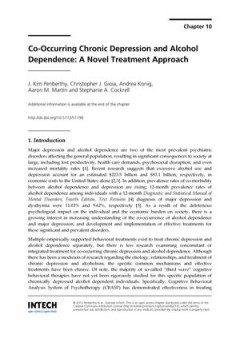
Co-Occurring Chronic Depression and Alcohol Dependence a Novel Treatment App…
Co-Occurring Chronic Depression and Alcohol Dependence: A Novel Treatment Approach
- Edition
- -
- ISBN/ISSN
- 9789535111474
- Collation
- -
- Series Title
- -
- Call Number
- -
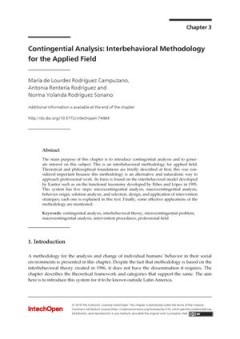
Contingential Analysis interbehavioral Methodology For The Applied Field
The main purpose of this chapter is to introduce contingential analysis and to generate interest on this subject. This is an interbehavioral methodology for applied field. Theoretical and philosophical foundations are briefly described at first; this was considered important because this methodology is an alternative and naturalistic way to approach professional work. Its basis is found on the …
- Edition
- -
- ISBN/ISSN
- 9781789232400
- Collation
- -
- Series Title
- -
- Call Number
- -
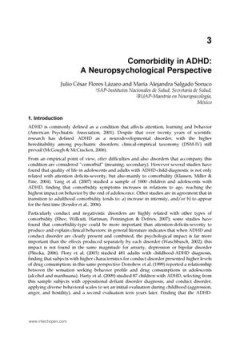
Comorbidity in Adhd a Neuropsychological Perspective
Comorbidity in ADHD: A Neuropsychological Perspective
- Edition
- -
- ISBN/ISSN
- 9789533078687
- Collation
- -
- Series Title
- -
- Call Number
- -

Cognitive-Behavioral Therapy of Obsessive-Compulsive Disorder in Children and…
While obsessive-compulsive disorder (OCD) is present under the category of anxiety disorders in DSM-IV TR, it is classified under “Obsessive Compulsive Disorder and Related Disorders” in DSM 5. There is no different diagnostic system for children and adolescents. OCD has serious adverse effects on family, school, and social lives of children and adolescents, but adolescents with OCD often h…
- Edition
- -
- ISBN/ISSN
- 9789535139270
- Collation
- -
- Series Title
- -
- Call Number
- -
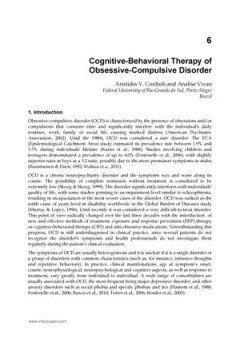
Cognitive-Behavioral Therapy of Obsessive-Compulsive Disorder
Cognitive-Behavioral Therapy of Obsessive-Compulsive Disorder
- Edition
- -
- ISBN/ISSN
- 9789535103127
- Collation
- -
- Series Title
- -
- Call Number
- -
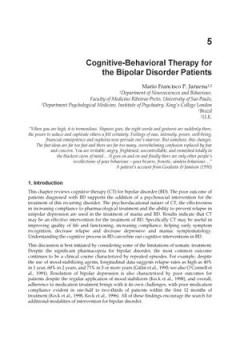
Cognitive-Behavioral Therapy for the Bipolar Disorder Patients
Cognitive-Behavioral Therapy for the Bipolar Disorder Patients
- Edition
- -
- ISBN/ISSN
- 9789535103127
- Collation
- -
- Series Title
- -
- Call Number
- -
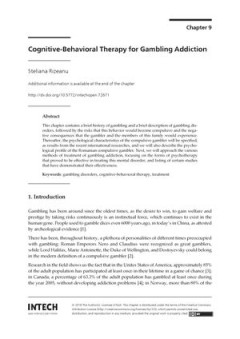
Cognitive-Behavioral Therapy for Gambling Addiction
This chapter contains a brief history of gambling and a brief description of gambling disorders, followed by the risks that this behavior would become compulsive and the negative consequences that the gambler and the members of this family would experience. Thereafter, the psychological characteristics of the compulsive gambler will be specified, as results from the recent international researc…
- Edition
- -
- ISBN/ISSN
- 9789535139270
- Collation
- -
- Series Title
- -
- Call Number
- -
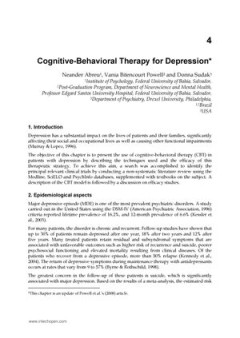
Cognitive-Behavioral Therapy for Depression
Cognitive-Behavioral Therapy for Depression
- Edition
- -
- ISBN/ISSN
- 9789535103127
- Collation
- -
- Series Title
- -
- Call Number
- -

Cognitive-Behavioral Therapy Current Paths in The Management of Obesity
The treatment of obesity and its related chronic symptoms is one of the major issues that world healthcare systems are facing today. Cognitive-behavioral therapy (CBT) is one of the most effective therapies in the treatment of dysfunctional eating behaviors. In the first part of the chapter, the phenomenon of obesity will be introduced; subsequently, the role of CBT into obesity treatment will …
- Edition
- -
- ISBN/ISSN
- 9789535139270
- Collation
- -
- Series Title
- -
- Call Number
- -
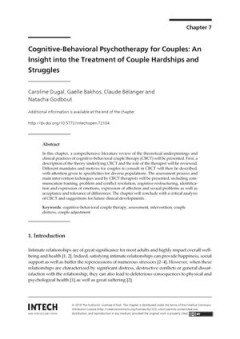
Cognitive-Behavioral Psychotherapy For Couples An insight into The Treatment…
In this chapter, a comprehensive literature review of the theoretical underpinnings and clinical practices of cognitive-behavioral couple therapy (CBCT) will be presented. First, a description of the theory underlying CBCT and the role of the therapist will be reviewed. Different mandates and motives for couples to consult in CBCT will then be described, with attention given to specificities fo…
- Edition
- -
- ISBN/ISSN
- 9789535139270
- Collation
- -
- Series Title
- -
- Call Number
- -
 Computer Science, Information & General Works
Computer Science, Information & General Works  Philosophy & Psychology
Philosophy & Psychology  Religion
Religion  Social Sciences
Social Sciences  Language
Language  Pure Science
Pure Science  Applied Sciences
Applied Sciences  Art & Recreation
Art & Recreation  Literature
Literature  History & Geography
History & Geography